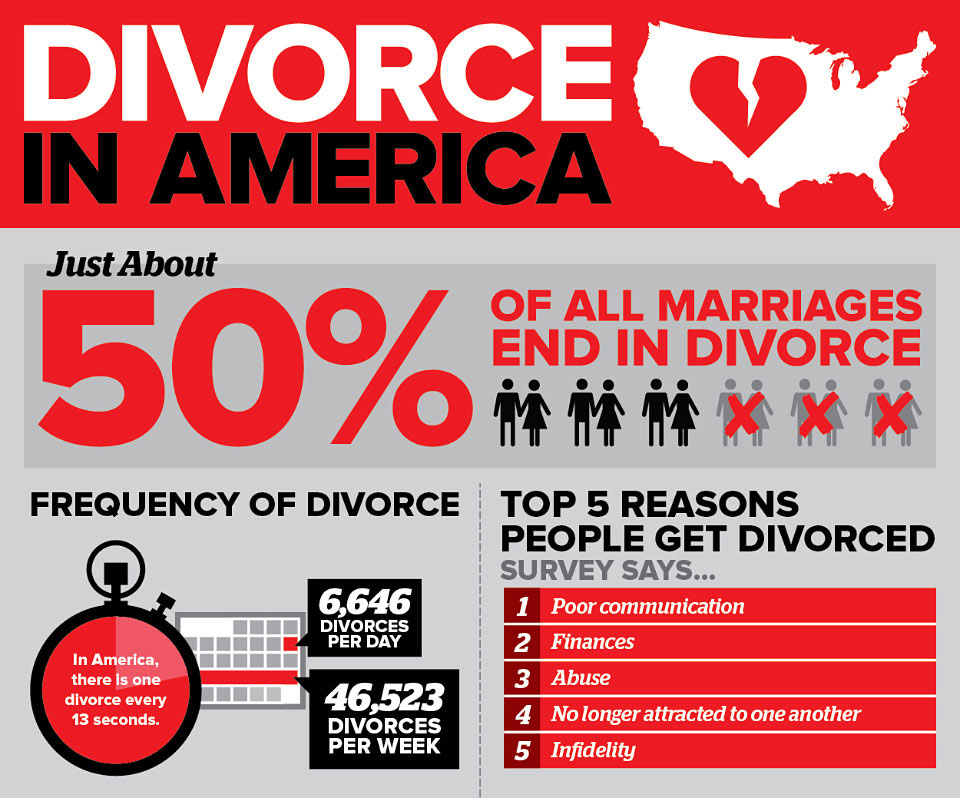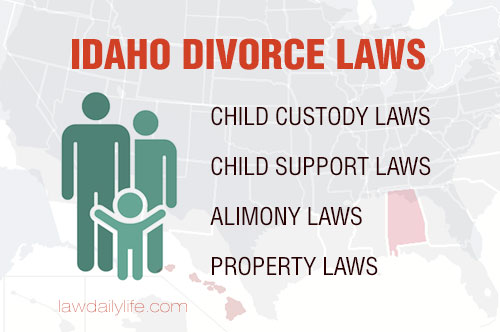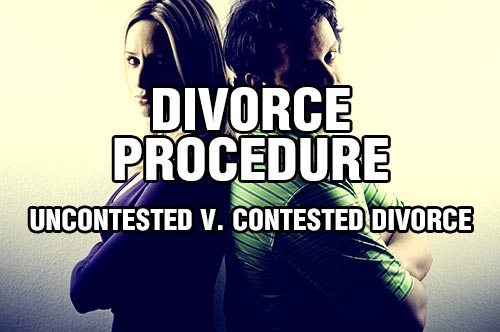The following is a summary of Idaho divorce laws. In some cases, the exact text of the statute has been simplified and/or modified to provide for easier understanding. For a more specific understanding of the laws, you should consult the full Idaho Code or ask an attorney how the law might apply to your particular situation.

Idaho Divorce Grounds
A divorce can be granted in Idaho for any of the following causes:
1. Adultery.
2. Extreme cruelty.
3. Willful desertion.
4. Willful neglect.
5. Habitual intemperance.
6. Conviction of felony.
7. When either the husband or wife has become permanently insane.
8. Irreconcilable differences.
– From 32-603 of the Idaho Statutes.
Residency Laws
You must be an Idaho resident for at least 6 weeks immediately before filing the divorce, before the divorce can be finalized.
-From 32-701 of the Idaho Statutes.
Waiting Period Before Divorce is Final
The divorce cannot be finalized until at least 20 days after filing the divorce and serving your spouse with the divorce papers.
-From 32-716 of the Idaho Statutes.
Idaho Alimony Laws
Idaho laws allow the court to grant alimony if it finds that the spouse seeking maintenance lacks sufficient property to provide for his or her reasonable needs and is unable to support himself or herself through employment.
The alimony award should be in such amounts and for such periods of time that the court deems just, after considering all relevant factors, which may include:
(a) The financial resources of the spouse seeking maintenance, including the marital property awarded to the spouse, and that spouse’s ability to meet his or her needs independently;
(b) The time necessary to acquire sufficient education and training to enable the spouse seeking maintenance to find employment;
(c) The duration of the marriage;
(d) The age and the physical and emotional condition of the spouse seeking maintenance;
(e) The ability of the spouse from whom maintenance is sought to meet his or her needs while meeting those of the spouse seeking maintenance;
(f) The tax consequences to each spouse;
(g) The fault of either party.
-From 32-705 of the Idaho Statutes.
Idaho Child Custody Laws
In a divorce, the court may award the custody, care and education of the children as may seem necessary or proper in the best interests of the children. The court should consider all relevant factors, which may include:
(a) The wishes of the child’s parent or parents as to his or her custody;
(b) The wishes of the child as to his or her custodian;
(c) The interaction and interrelationship of the child with his or her parent or parents, and his or her siblings;
(d) The child’s adjustment to his or her home, school, and community;
(e) The character and circumstances of all individuals involved;
(f) The need to promote continuity and stability in the life of the child; and
(g) Domestic violence, whether or not in the presence of the child.
-From 32-717 of the Idaho Statutes.
Access to Records
Notwithstanding any other provisions of law, access to records and information pertaining to a minor child including, but not limited to, medical, dental, health, and school or educational records, shall not be denied to a parent because the parent is not the child’s custodial parent. However, information concerning the minor child’s address shall be deleted from such records to a parent, if the custodial parent has advised the records custodian in writing to do so.
-From 32-717A of the Idaho Statutes.
Idaho Child Support Laws
There are specific child support guidelines that will determine how much child support should be paid in Idaho. Child support typically can’t be waived by the parents, although a judge might decide this on a case-by-case basis, looking at all factors. If you and your spouse agree to an amount of child support that’s different than the guidelines would order, the judge will decide if that amount is in the child’s best interests.
Child support should be paid until the child is 18 years old, unless the child is still in high school, in which case the court may, at its discretion, order the continuation of support payments until the child discontinues his high school education or reaches the age of 19, whichever is sooner. The court will order child support without regard to marital misconduct, after considering all relevant factors which may include:
(a) The financial resources of the child;
(b) The financial resources, needs, and obligations of both the custodial and noncustodial parents which ordinarily shall not include a parent’s community property interest in the financial resources or obligations of a spouse who is not a parent of the child, unless compelling reasons exist;
(c) The standard of living the child enjoyed during the marriage;
(d) The physical and emotional condition and needs of the child and his or her educational needs;
(e) The availability of medical coverage for the child at reasonable cost;
(f) The actual tax benefit recognized by the party claiming the federal child dependency exemption.
-From 32-706 of the Idaho Statutes.
Income Withholding
The court must order an immediate income withholding order, unless:
(a) The court makes a specific written finding that there is good cause not to require immediate income withholding. A finding of good cause by the court must be based on, at a minimum:
(i) A written determination and explanation of why implementing immediate withholding would not be in the best interests of the child; and
(ii) Proof of timely payment of previously ordered support in cases involving the modification of support orders; or
(b) A written agreement is reached between the obligor and obligee and the department in cases where the department is providing child support services, which provides for an alternative arrangement, and such agreement is determined by the court to be in the best interests of the child.
-From 32-1204 of the Idaho Statutes.
Idaho Property Division Laws
If you and your spouse are able to agree how to divide your property, the court will be usually (though not always) inclined to accept your agreement. If you can’t agree, you’ll be at the mercy of the court’s decisions. Either way, you may want to be aware of the guidelines a court will use when dividing property.
Idaho is a community property state. The court will consider all the facts of the case and the condition of the parties to make a just decision on the division of property and debts. Unless there are compelling reasons otherwise, there shall be a substantially equal division in value, considering debts, between the spouses. Factors which may bear upon whether a division shall be equal, or the manner of division, include, but are not limited to:
(1) Duration of the marriage;
(2) Any antenuptial agreement of the parties; provided, however, that the court shall have no authority to amend or rescind any such agreement;
(3) The age, health, occupation, amount and source of income, vocational skills, employability, and liabilities of each spouse;
(4) The needs of each spouse;
(5) Whether the apportionment is in lieu of or in addition to maintenance;
(6) The present and potential earning capability of each party; and
(7) Retirement benefits, including, but not limited to, social security, civil service, military and railroad retirement benefits.
-From 32-712 of the Idaho Statutes.










